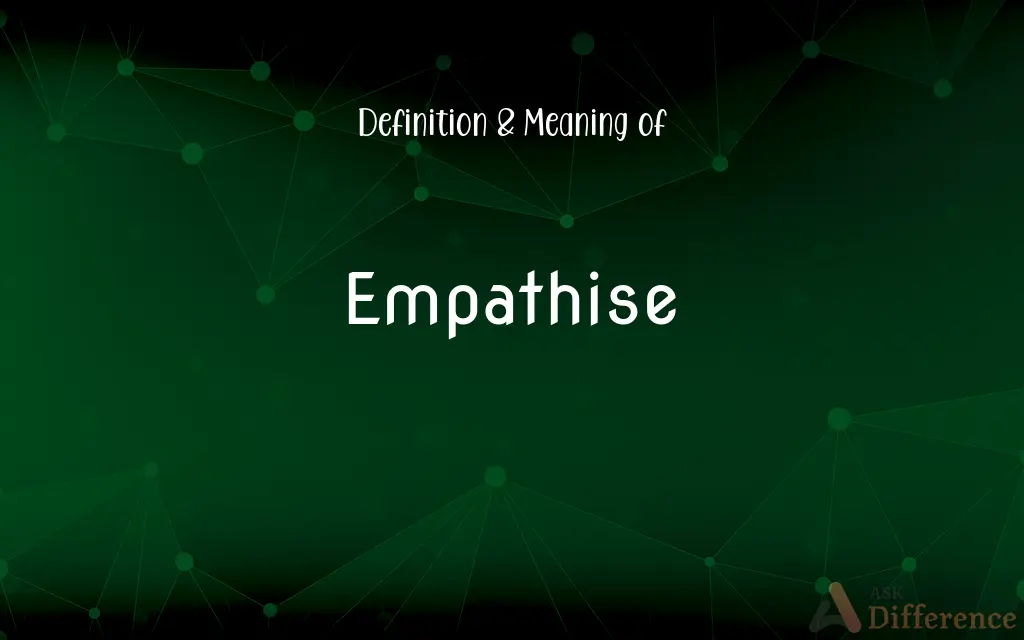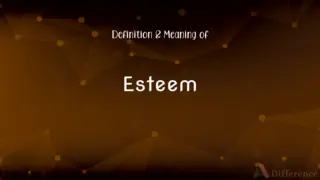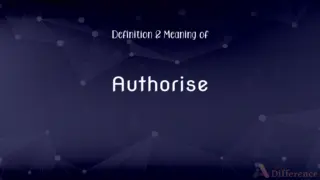Empathise Definition and Meaning
By Fiza Rafique & Urooj Arif — Published on April 21, 2024
Empathise means to understand and share the feelings of another. e.g., She could empathise with her friend's situation having gone through something similar herself.

Table of Contents
Empathise Definitions
To share or understand the feelings, emotions, or experiences of another person.
He can empathise with the challenges faced by new students.
To exhibit empathy or a deep emotional understanding of another's feelings or problems.
The counselor is trained to empathise with clients from diverse backgrounds.
To put oneself in another's shoes, feeling what they feel.
As a parent, she could easily empathise with their concerns for their children.
To connect with someone emotionally and understand their feelings without necessarily having experienced the same situation.
Even though he hadn't lost a job before, he could still empathise with his friend's distress.
To respond to someone's emotional state by experiencing similar feelings due to empathy.
She empathised with her sister's anxiety over the exams.
Standard spelling of empathize
Be understanding of;
You don't need to explain--I understand!
Empathise Snonyms
Understand
To perceive the intended meaning of (words, a language, or a speaker).
He understands the pain of losing a loved one.
Sympathize
To agree with a sentiment or opinion; to feel or express sympathy.
He sympathized with their struggle for justice.
Identify
To associate (someone) closely with; to regard (someone) as having strong links with.
She identifies with the characters in the story because of her own journey.
Be in tune with
To be in agreement or harmony with.
He is in tune with his friend's feelings and offers support when needed.
Relate
To establish a social or sympathetic relationship with someone.
She relates well to the problems faced by single mothers.
Commiserate
To feel or express sympathy or compassion.
They commiserated with each other over their shared experiences.
Connect
To bring together or into contact so that a real or notional link is established.
He connects with others who have experienced loss.
Share
To have a portion of (something) with another or others.
They shared their fears and hopes, strengthening their bond.
Feel for
To feel sympathy or empathy towards someone.
She really feels for people who are going through difficult times.
Reconcile
To make or show to be compatible.
She reconciled her own experiences with those of her colleague to better understand her situation.
Empathise Example Sentences
It's important to empathise with others to understand their perspectives better.
Through active listening, he learned to empathise with his partner's feelings.
She found it easy to empathise with the character in the novel due to her own experiences.
The therapist's empathise with his clients helped them feel understood and supported.
She teaches her children to empathise with others as a fundamental value.
The ability to empathise can significantly improve interpersonal relationships.
They empathise with each other, having shared similar challenges.
Common Curiosities
How many syllables are in empathise?
There are three syllables in "empathise."
What is a stressed syllable in empathise?
The stressed syllable in "empathise" is the first syllable, "em."
What is the first form of empathise?
The first form of "empathise" is "empathise," which is the base form.
Why is it called empathise?
The term "empathise" comes from the word "empathy," which originates from the Greek "empatheia," meaning "passion" or "state of emotion." "Empatheia" itself is derived from "en," meaning "in," and "pathos," meaning "feeling." To empathise means to understand and share the feelings of another.
What is the root word of empathise?
The root word of "empathise" is "empathy," which comes from the Greek "empatheia," meaning "affection" or "passion."
What is the second form of empathise?
The second form of "empathise" is "empathised," which is the simple past tense form.
How do we divide empathise into syllables?
"Empathise" is divided into syllables as "em-pa-thise."
How is empathise used in a sentence?
"Empathise" is used to describe the ability to understand and share the feelings of another, e.g., It's important to empathise with your friends when they're going through a hard time.
What is the singular form of empathise?
"Empathise" is already in its singular form as a verb.
What is another term for empathise?
Another term for "empathise" could be "sympathise," although "sympathise" may imply feeling pity or sorrow for someone's misfortune rather than sharing their feelings.
Is empathise an adverb?
No, "empathise" is not an adverb; it's a verb.
What is the verb form of empathise?
"Empathise" itself is a verb. The forms include the base form "empathise," the past tense "empathised," and the gerund or present participle "empathising."
What is the pronunciation of empathise?
"Empathise" is pronounced as /ˈɛmpəθaɪz/.
Is the word empathise a Gerund?
When used with -ing, as in "empathising," it functions as a gerund.
What part of speech is empathise?
"Empathise" is a verb.
Is empathise an abstract noun?
No, "empathise" is a verb, so it cannot be an abstract noun.
Is empathise a negative or positive word?
"Empathise" is generally considered a positive word as it involves understanding and sharing the feelings of others.
Is the word “empathise” a Direct object or an Indirect object?
"Empathise" is a verb, so it does not serve as a direct or indirect object, but it can take an object in sentences, e.g., "It's hard to empathise with someone who hides their feelings."
Which determiner is used with empathise?
As a verb, "empathise" does not directly take a determiner, but its object might, depending on the context.
What is the plural form of empathise?
As a verb, "empathise" does not have a plural form, but its usage varies with the subject (e.g., "I empathise," "we empathise").
What is the opposite of empathise?
The opposite of "empathise" could be "disregard" or "be indifferent."
Is empathise a vowel or consonant?
The word "empathise" starts with a vowel.
Is empathise a countable noun?
"Empathise" is not a noun; it is a verb, so it does not have a countable form.
Which preposition is used with empathise?
Common prepositions used with "empathise" include "with," as in "empathise with someone."
What is the third form of empathise?
The third form of "empathise" is "empathised," used as the past participle in perfect tenses.
Is empathise a noun or adjective?
"Empathise" is a verb.
Is empathise a collective noun?
No, "empathise" is not a noun; it is a verb and does not have a collective form.
Is the empathise term a metaphor?
"Empathise" can be used metaphorically to describe a deep level of understanding or connection with someone or something.
Which vowel is used before empathise?
The vowel or consonant used before "empathise" depends on the preceding word in a sentence, not a specific rule for "empathise."
Which conjunction is used with empathise?
Conjunctions like "and," "but," or "or" can be used in sentences with "empathise," depending on the sentence structure.
Which article is used with empathise?
As a verb, "empathise" does not directly take an article, but an article may be used with its object, depending on the context, e.g., "empathise with the victim."
Is the word empathise imperative?
"Empathise" can be used in the imperative mood as a command or advice, e.g., "Empathise with those around you."
Share Your Discovery

Previous Term
Esteem Definition and Meaning
Next Term
Subdue Definition and MeaningAuthor Spotlight
Written by
Fiza RafiqueFiza Rafique is a skilled content writer at AskDifference.com, where she meticulously refines and enhances written pieces. Drawing from her vast editorial expertise, Fiza ensures clarity, accuracy, and precision in every article. Passionate about language, she continually seeks to elevate the quality of content for readers worldwide.
Co-written by
Urooj ArifUrooj is a skilled content writer at Ask Difference, known for her exceptional ability to simplify complex topics into engaging and informative content. With a passion for research and a flair for clear, concise writing, she consistently delivers articles that resonate with our diverse audience.

































